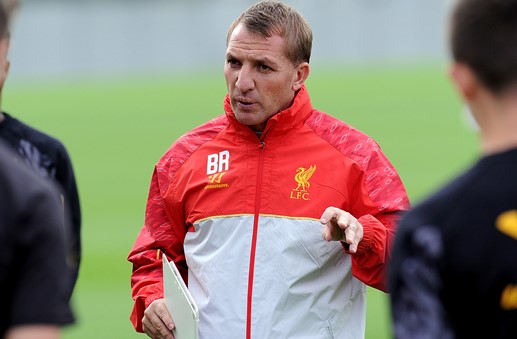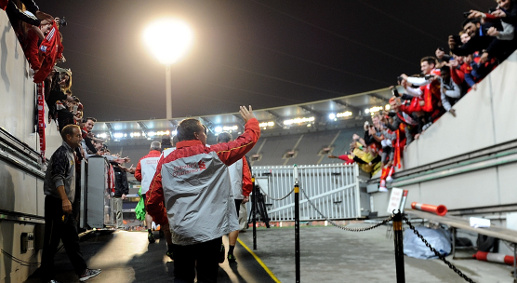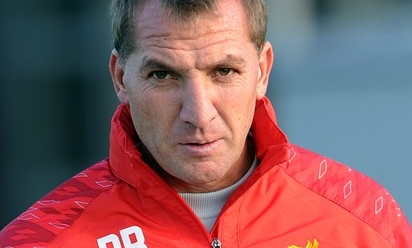Rodgers: I want brave players here
Brendan Rodgers has explained that the most important characteristic he identifies when planning to sign a player for Liverpool is his bravery when in possession of the football.
In an interview with Bleacher Report, the Northern Irishman describes what a 'typical day' for the manager of Liverpool Football Club might involve and how he approaches the task.
Rodgers also shares his personal philosophy for training sessions at Melwood and discusses the legacy he dreams of leaving when his tenure as Reds boss eventually concludes.
Can you walk us through your typical day on the training ground?
That's a difficult one, because in football there is very rarely a 'typical day' - there are always issues and challenges that arise from nowhere, and as manager you have to be ready to deal with them. There is routine, in as much as a schedule that is followed and carefully planned. I've always been one to arrive early for work; preparation is a big part of how I work, and I like to be in my office going through plans for the upcoming training sessions or meetings I have.
I have a senior staff meeting every day, with key personnel who interface with the players - coaches, the medical staff, our analyst department. This is a useful exercise as it means we are all across what is happening and they are aware of my expectations.
More often than not, training will start at Melwood at 10.30am. I am present and engaged in every session, so I will always be on the training ground with them. The afternoon tends to be dominated by meetings with coaching staff and analysts, and we focus on our next game - what our plans are, any issues we expect to face etc.
Beyond that, it will depend if there is a game on somewhere that I will watch - be it in person or matches I've asked to be recorded. This includes scouting our upcoming opponents and potential transfer targets. My days tend to be packed, but I wouldn't have it any other way. I enjoy my work, and it is a privilege to do what I do.
How much influence do you have on the make-up of Liverpool training sessions? Do they follow a regular pattern during the season, or are you always reacting to things you see in matches and preparing for the game ahead?
I dictate entirely how the team is prepared, and I am a hands-on coach; I love to be out there with the players taking the sessions. I'm blessed to be supported by some brilliant staff, who are all experts in their field and dedicated to what they do. As I've mentioned previously, I meet regularly with my staff to ensure they are aware of what I want, but also to make sure they have the chance to influence the process and use all of their knowledge to help prepare the group.
We do have a pattern here in terms of the training schedule, which is designed specifically to produce elite performance. It is all about getting the players to their maximum for matchdays. I have a four-day build-up training-wise to matches, and that encompasses recovery as well as tactical work and making sure they are in good physical shape. In terms of reacting to things we see as the season unfolds, as a staff we are constantly analysing performance and identifying areas where we can improve. That work is also done on the training field.

How important is the analysis of statistics in the decisions you make as a manager?
It's a big part of the modern game, and it's important as a modern manager to embrace areas that can help your team and players improve. However, statistics and numbers are no good unless you have good people to analyse and then interpret their meaning and importance. Even more important than that is then having the staff that can take the data and ensure it's presented in a way that improves individuals and teams. I have tremendous professionals in that area supporting me and the team, and we do use them at the appropriate time as part of our preparation.
When it comes to selecting your starting XI, who are the people at Liverpool you consult first and how do you inform your players?
My senior staff members are integral to all the decision-making, and it's the reason the quality of people you have around you as a manager is so vital. There are various factors that influence that process; fitness, form and the tactical approach to your opponent are all areas I review on a daily basis. Of course, as manager, the selection of the team is very much one of the biggest responsibilities I personally take, but I come to that decision thanks to advice and support of the people around me.
How has the role of Liverpool manager changed since the days of Bob Paisley and Bill Shankly?
I think football management has obviously changed and evolved in terms of practices and methods, but I would say the values we strive to hold are the same as great men like Bill Shankly and Bob Paisley. Particularly at a club like Liverpool, where our core values are so important to us, it's vital for the man sat in my chair to embrace what the place stands for. But when you break it down, I face the same challenges that Bill Shankly and Bob Paisley did: carrying the expectations of a worldwide institution and its incredible supporters who want Liverpool to be among the elite at home and in Europe.
Is dealing with stress an issue for you? How do you relieve the natural worry that must come with making big decisions? Do you have an escape mechanism?
I don't see the job as stressful, I really don't. Of course, there is pressure and expectation, but I wouldn't necessarily equate that with stress. There are hard-working people in Liverpool and up and down the country who encounter real stress, by worrying about how to pay the bills and feed and clothe their children. That's stress, and I don't think it's fair to tally what they go through with the problems of being a football manager.
What I do is a privilege, and I enjoy my work. The reason I worked so hard all my life to get into a position such as this is because I want to be making big decisions and managing at the very highest level. Of course, there are times when you have to switch off, but that's part and parcel of managing yourself, and I've never really found that a problem.
What are the qualities you're most looking for in an aspiring professional - both as a footballer and a personality?
I think my history as a coach shows I like players who are gifted technically and have courage when it comes to being in possession of a football. That is a key quality for me; can you be brave on the pitch, not in terms of 50/50 tackles, but having the ball and looking to play in areas others wouldn't? I would say you can't divorce the two - ability and personality. It all comes as part of the package. A player's character is a crucial factor I look into before committing to signing them. They also need to show a willingness to learn, regardless of age and experience; that's very important to me.

How would you like Liverpool fans to remember you when you eventually hand over to another manager at the club?
That's a very difficult question to answer, as I think someone's legacy is best judged by other people, rather than yourself. I suppose, in general terms, I hope when my time as Liverpool manager is over, I'm remembered as someone who improved the team and left the club in a better position than I inherited it.
I hope they enjoy the style of football the team plays and recognise we approach games to win them but win them in a way that entertains and makes them proud as Liverpool supporters. But I suppose, most important, is that people recognise I did my best every day I was here to make Liverpool the best it possibly can be, while upholding the football values that this great club was built on. I am blessed and privileged to lead this club, and I will cherish that for every second and minute I'm here.



